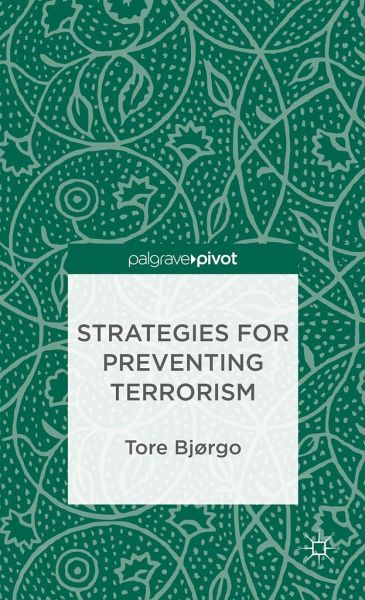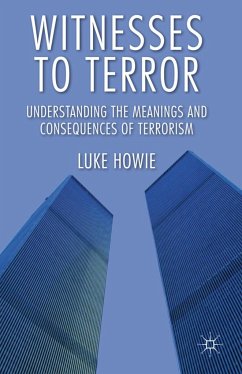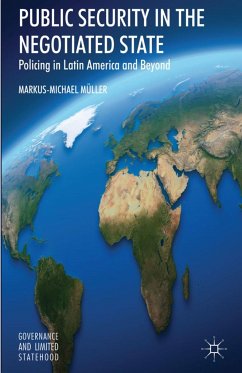
T. Bjorgo
Gebundenes Buch
Strategies for Preventing Terrorism
Versandkostenfrei!
Versandfertig in 6-10 Tagen
Weitere Ausgaben:

PAYBACK Punkte
21 °P sammeln!





This innovative new book aims to put society's fight against terrorism into a comprehensive crime prevention perspective with a clear, understandable theoretical foundation, developing a general model for the prevention of crime which is, in this book, applied to terrorism.
Tore Bjørgo is Professor of Police Science at the Norwegian Police University College and Adjunct Research Professor at the Norwegian Institute of International Affairs. He has authored and edited eleven books, including Terror from the Extreme Right (1995); Root Causes of Terrorism (2005); and Leaving Terrorism Behind (2009).
Produktdetails
- Verlag: Palgrave Macmillan UK / Palgrave Pivot / Springer Palgrave Macmillan
- Artikelnr. des Verlages: 978-1-137-35507-2
- 2013
- Seitenzahl: 128
- Erscheinungstermin: 3. Mai 2013
- Englisch
- Abmessung: 223mm x 148mm x 15mm
- Gewicht: 263g
- ISBN-13: 9781137355072
- ISBN-10: 1137355077
- Artikelnr.: 38058463
Herstellerkennzeichnung
Libri GmbH
Europaallee 1
36244 Bad Hersfeld
gpsr@libri.de
"By providing such a comprehensive, systematic and integrated framework to identify the components that constitute an effective counter-terrorism campaign, this short book is bound to be considered as one of the classical works in the discipline of counterterrorism studies." - Perspectives on Terrorism
"Strategies for Preventing Terrorism is an important book for those who study terrorism and terrorists. But it is more than that. Because of its effective integration into mainstream criminology and criminal justice practice, this book should have wide
readership among scholars and practitioners. Bjorgo builds on a number of theories (deterrence, life course, rational choice) and study topics (recruitment and joining groups,
"Strategies for Preventing Terrorism is an important book for those who study terrorism and terrorists. But it is more than that. Because of its effective integration into mainstream criminology and criminal justice practice, this book should have wide
readership among scholars and practitioners. Bjorgo builds on a number of theories (deterrence, life course, rational choice) and study topics (recruitment and joining groups,
Mehr anzeigen
group process, desistance) that [will] resonate with criminologists and criminal justice
policy makers and practitioners." - Crime, Law and Social Change
"This book provides a blueprint for future scholarship in a wide range of criminological scenarios. It looks set to become a seminal and landmark text in a field of study that is in urgent need of the theoretical clarity and rigour that it possesses." - Robert Lambert, University of St. Andrews, UK
"The book is an eye-opener - once you have read it you wonder how we could fail to see the problem of prevention of terrorism in any other terms. It should be on the desk of every counter-terrorism professional." - Alex P. Schmid, Fellow of the International Centre for Counter-Terrorism
"Strategies for Preventing Terrorism is an important book for those who study terrorism and terrorists ... Bjorgo builds on a number of theories (deterrence, life course, rational choice) and study topics (recruitment and joining groups, group process, desistance) that resonate with criminologists and criminal justice policy makers and practitioners. Bjorgo has worked extensively with gangs, right wing hate groups and terrorists in the past and the depthof his research experience and work with policy makers is evident throughout the book. In particular, his command of and experience contributing to the literature on crime groups gives the book a depth of understanding missing in many other works on terrorism." - Scott Decker, Crime, Law and Social Change
policy makers and practitioners." - Crime, Law and Social Change
"This book provides a blueprint for future scholarship in a wide range of criminological scenarios. It looks set to become a seminal and landmark text in a field of study that is in urgent need of the theoretical clarity and rigour that it possesses." - Robert Lambert, University of St. Andrews, UK
"The book is an eye-opener - once you have read it you wonder how we could fail to see the problem of prevention of terrorism in any other terms. It should be on the desk of every counter-terrorism professional." - Alex P. Schmid, Fellow of the International Centre for Counter-Terrorism
"Strategies for Preventing Terrorism is an important book for those who study terrorism and terrorists ... Bjorgo builds on a number of theories (deterrence, life course, rational choice) and study topics (recruitment and joining groups, group process, desistance) that resonate with criminologists and criminal justice policy makers and practitioners. Bjorgo has worked extensively with gangs, right wing hate groups and terrorists in the past and the depthof his research experience and work with policy makers is evident throughout the book. In particular, his command of and experience contributing to the literature on crime groups gives the book a depth of understanding missing in many other works on terrorism." - Scott Decker, Crime, Law and Social Change
Schließen
Für dieses Produkt wurde noch keine Bewertung abgegeben. Wir würden uns sehr freuen, wenn du die erste Bewertung schreibst!
Eine Bewertung schreiben
Eine Bewertung schreiben
Andere Kunden interessierten sich für













